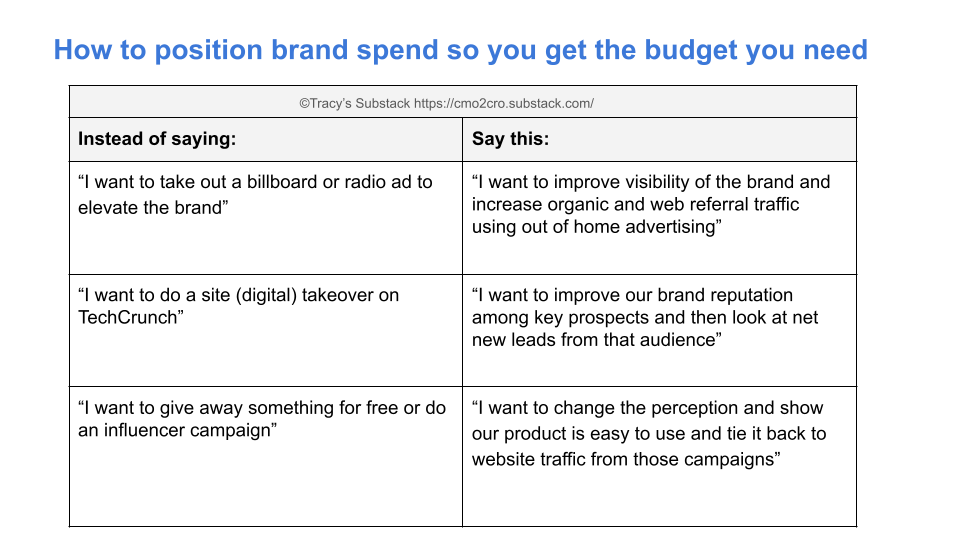The CMO has the shortest tenure in the C-Suite, and yet it plays a critical function to any business. Per Korn Ferry and Spencer Stuart, the average is around 4.2 years for the Fortune 500. For B2B SaaS startups it’s more like 18-24 months, and that’s largely due to the “growth at any cost” notion where CMOs seem easily expendable.
But the CMO role is not dead and it’s not going away. Starbucks, Walgreens, Etsy, UPS, Uber, Johnson & Johnson have all ditched the CMO title. But so did McDonald’s and Coca-Cola a while ago only to bring it back. Liat Ben-Zur talks in a recent LinkedIn post about how the role is simply getting a makeover.
“The Chief Marketing Officer role isn't disappearing; it's evolving to meet the demands of a data-driven era.” - Liat Ben-Zur
It’s all about being able to tie the consumer journey and experience back to measurable business outcomes.
Broad perspective
Today CMOs are tasked with a lot. We analyze the market, develop a plan, and tie it back to the P&L. Moving forward, the CMO needs to have a broader perspective of what’s driving financial outcomes for the business and we need to be able to communicate this efficiently and effectively to our C-Suite colleagues so they get excited about what we’re doing.
But what often gets conflated here is while you do need to have a broader perspective, you don’t need to know everything there is about everything. This is why you hire people smarter than you or outsource the work to help you execute your strategy.
You need to understand what the business outcomes are and have a clear definition of what success looks like and set those expectations early on with the C-Suite and the board.
You need to prioritize, allocate resources, and define internal optics. No one is going to ever fully understand all that you do as a CMO, how much of the business you touch, or what your impact is, so do yourself a favor and stop trying to solve every perception and every problem. That’s not your role. Focus, prioritization, outcomes — those are where the best use of your energy can be spent.
Impact of AI on the Future CMO
I’d be remiss to not talk about AI (especially after working at an AI company for 2.5 years).
AI is overwhelming and it’s also young. Meaning, we do not know it’s full future impact. We know it can synthesize data quickly, it can create efficiencies that were not possible in marketing before. It’s similar to social media when it came on the scene. No one knew it’s potential. Some people could see it. Some folks hopped on the bandwagon and made careers out of it. You need to be aware, experiment with it, and use it strategically where it makes sense. Does the Future CMO need to know about AI in this capacity? Yes, embrace it, but don’t die on a hill for it.
Fundamentals will always reign supreme
Product market fit will make or break any company. Figuring out or designing your category, positioning it in the right places so that when people are looking for the product you sell, it’s there.
However, the one thing AI can’t do is evoke a feeling from people when they experience your product. No one cares about your product. They only care about the problem it can solve for them at that given moment. That gives them a feeling of a tribe, this brand understands their problem and it is filled with a community of others just like them with whom they can bond. This power of connection, the emotional experience you get from a brand is what makes great brands stand out. You can’t manufacture emotions with AI and it’s a key fundamental of brands that are successful. (e.g. Slack, Notion, Clay, Webflow, Adobe).
Brand is another key fundamental. You can’t have demand without brand, and yet no one gives a shit about or understands the full impact of brand except for — marketers. This is because we position brand spend in a non-digestible way for the rest of the company and many marketers struggles with how to quantify it.
However, it’s all about how you position it internally.
Becoming a seller
I’m seeing it more and more where the CMO is reporting into the CRO and this is a sad reality for CMOs because most (not all) CROs do not have a marketing background. In this dynamic, marketing doesn’t just work for sales, they become a slave to sales. When in fact, marketing is central to the entire go to market, touching all aspects of the business from pre to post sales and beyond.
The future forward CMO will need to figure out how to work for a CRO with no marketing experience. It’s the future.
In this new reality, there may be a lot less room for brand, but only if you can’t sell it. Your new role requires you not only to market Marketing, but to sell Marketing’s value to your CRO. One team, one dream as they say.
To sell marketing’s value your CRO you need to be able to tie back your metrics to not only overall business outcomes, but sales impact. You have to be super in sync and be real business partners who trust one another.
***
Like this CMO2CRO Substack? Subscribe for free to receive new posts or share it to support my work. Thanks!




